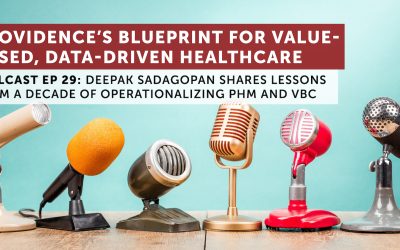 Last month, Alex Lennox-Miller joined Chilmark Research as our newest analyst. He will lead our research on population health management, though he is already helping out in a few other domains as well. Before Chilmark, Alex worked as a Senior Business Analyst at Lahey Health System, a provider organization with 3 hospitals and about 100 ambulatory and primary care clinics here in the Boston area. Recently, I interviewed Alex about what brought him to Chilmark and what he will bring to his research here.
Last month, Alex Lennox-Miller joined Chilmark Research as our newest analyst. He will lead our research on population health management, though he is already helping out in a few other domains as well. Before Chilmark, Alex worked as a Senior Business Analyst at Lahey Health System, a provider organization with 3 hospitals and about 100 ambulatory and primary care clinics here in the Boston area. Recently, I interviewed Alex about what brought him to Chilmark and what he will bring to his research here.
(Answers have been edited for clarity and length.)
What stood out to you about Chilmark?
I was originally interested when I saw the job posting on LinkedIn. I looked up the website, read some of the free research and blog posts, talked with a former analyst, and it just sounded like a really interesting opportunity. I was looking for career progression, and really interested in doing more in-depth, long-form research. A lot of my work at Lahey was smaller projects: on-demand analytics, data retrieval, and working with the EHR. I was working with project managers who were embedded with particular projects, and there’s not much of a chance to dig into stuff, even if there’s a lot of possibility and potential. So, the chance to go more in-depth, pursue something and really write more, was very interesting. I’ve always enjoyed writing and doing research projects, so the chance to do that professionally was really exciting.
What sorts of topics are you excited to research or do you wish you had a chance to do while you were at Lahey?
Population health. As part of an improvement project on the rooming process (what happens before a doctor sees a patient in the exam room) at primary care clinics, I had to learn a lot about our payer contracts, value-based payments, efficiency payments, ACO, AQC, etc. It was really remarkable that this was not a bigger part of the conversation at Lahey, in terms of how we act, how we train, the lack of standardization, the lack of baseline expectations. We were losing out on a lot of money partly because providers’ practices didn’t really know that this stuff existed. I found it all fascinating, and it’s something that I’m excited to dig into and write about more.
There are so many tools to help manage those contracts, but also to provide visibility into different ways to improve efficiency and spending, and to make sure that you’re being proactive instead of reactive when it comes to population health management—the buzzwords are terrible, but there’s just no better way to put it. Many people are trying to move healthcare analytics from being purely reactive to being either predictive or prescriptive. Outside of healthcare, people are doing much better with it, and I’m really interested in exploring that area and helping HCOs and those companies meet each other and drive adoption because there’s so much to be accomplished there.
What else are you looking forward to doing and is there anything else in your professional background will you bring into your research?
A few things: having a background in process improvement and process analysis, which is project management basically. A very detailed plan with step 1, step 2, step 3 I think is something any organization can benefit from. When you have a HUGE piece of writing, the more you can break that down into component parts and identify what is each distinct element that needs to happen, the easier it becomes. Big writing projects were something I had a really good time with in business school. Its something I had really good results when I was doing independent consulting, and then when I was at Lahey. The bigger projects that make people say, “Oh my god, how are we ever going to tackle this?” Well, let’s step back and figure out what do we have to do now versus what do we have to do next. And so I think that’s a skill that’s valuable in a lot of contexts.
Is there anything else you want our readers to know about you?
I’ve sort of grown up around healthcare, my mom’s a doctor, my wife is a nurse. It’s a fascinating topic, but it’s also one where we are really fortunate to be in a position to really make a big difference in people’s lives. Even though I’m not working at a healthcare system anymore, it’s still true. The ability to help people do their jobs better, to my mind, matters so much more in this industry than almost anywhere else.




0 Comments